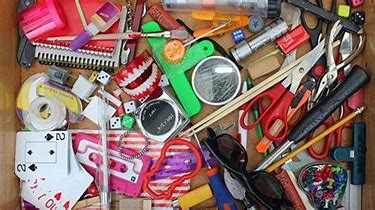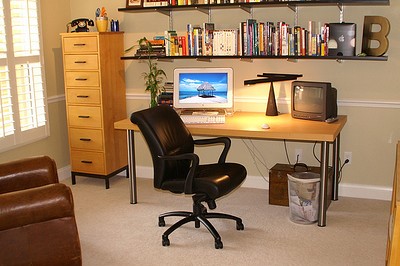By Kelly Brevig

“Where does this go?” my husband asks as he stands in the doorway of our massive, catch-all closet. From the other room, I replied, “The second shelf down, right-hand side, just lower than my line of sight, in a pink basket.” I’m hoping he finds the right spot, or the storage space might avalanche. This closet is an epicenter of stress. One false move and we will be buried in half-done projects, seldom-used kitchen items, pictures, board games and every item that doesn’t yet have a home. Clutter, while supposedly the sign of a genius, can negatively impact our mental health by causing stress. Albert Einstein was known to have a messy desk. He was also intuitive, creative and a visionary. I am no “Einstein” by any means, yet I have often felt comfort in knowing that creative minds tend to have messy environments. Validated by this thought, our closet has now taken on a life of its own. This barely-contained chaos has got to go.
Dorothy Day once said, “Life itself is a haphazard, untidy, messy affair.” Life is messy; my house doesn’t have to be. In doing a bit of research, I’ve found that women disproportionately encounter higher levels of cortisol (the stress hormone) when their environment is disorderly. In contrast, people with cleaner homes experience greater physical health than their less organized friends. Clutter can interfere with pleasure and lead to procrastination. It can negatively impact our working memory and cause sleep deprivation. Fear of being discovered and judged a hoarder can cause embarrassment and even isolation. Hoarding itself is linked to obesity and binge eating. Mind-wandering, pleasure-killing clutter can stop us in our tracks and hijack our self-control. How do we get it back?
Letting Go of Clutter
Taking control of one’s life can be easier said than done, especially if depression and anxiety are involved. Often times we may have good intentions, but not sure exactly where to begin. I’ve recently been inspired by a series on Netflix titled, “Tidying Up” with Marie Kondo. Seeing other people learn how to organize and eliminate unused items has been inspiring. There are many resources on the Internet and within our community which can assist us in helping simplify and organize our lives. One of the things in common with the methods I’ve researched is to let go of items that are no longer used. It doesn’t matter if you donate, sell, or bring your items to a consignment shop, letting go of things can be validating and increase our generosity. Being generous creates feelings of self-satisfaction and bring happiness. Also, actually starting a project is necessary if it is going to ever get done. The mountain might be big, but it won’t move by itself. Don’t be afraid to start small and ask for help. Slow and steady wins the race.

Rome wasn’t built in a day, and neither was my closet collection. In fact, I’m sure there are items in the far corners that were placed there when we moved in 14 ½ years ago. I’m guessing that this “little” project of mine will take longer than a few days to complete. The transparency of that sentence is a bit embarrassing, but I’m betting I’m not the only one with out-of-reach places that are crammed full of things we didn’t quite know where to put. Everyone has “stuff”, both physical and emotional. The goal here is to take control of what we can, let go of things that are no longer needed, and prioritize our life in a way that makes sense and is manageable. It has been said that “home is not a place, it’s a feeling” and that “home is where our story begins.” Here’s to starting the year with less clutter and stress, and increasing our overall health and happiness. This is where our story begins, where we tell it to.
Kelly Brevig is the Suicide Services Coordinator for Evergreen Youth and Family Services in Bemidji, MN.
